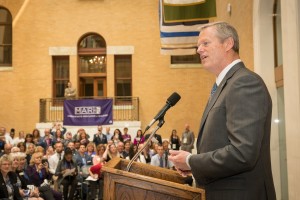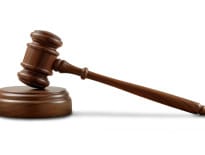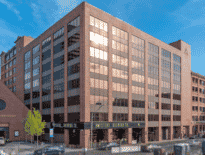
Gov. Charlie Baker gives the keynote speech at the 2018 Margaret C. Carlson Realtor Day on Beacon Hill.
Facing blame from Democrats for mounting public frustration with clogged roads and public transit problems, Gov. Charlie Baker touted his administration’s plan to pour more money into transportation over the next five years than “in any five-year period outside of the Big Dig,” but said the state doesn’t need to raise taxes to confront the congestion problems.
The governor’s defense of his administration’s approach to the state’s transportation system woes came after new polling data was released showing that the vast majority of Massachusetts workers experience some level of frustration and anger with their daily commutes.
Sixty-six percent of voters in the MassINC Polling Group survey said action was “urgently needed” to improve the state’s transportation system, and 80 percent said they support the general idea of the state raising new money to spend on roads, bridges and public transit.
“I don’t believe that raising taxes is the answer to this problem at this point in time,” Baker said. “I think the answer is to pursue the strategies that we’ve proposed, which as I said is the largest investment the commonwealth has made in any five-year period outside of the Big Dig.”
Baker reiterated his administration’s plan to spend $8 billion in capital funding over the next five years on public transportation, and a “similar amount” on roads and bridges.
Wednesday’s poll shined a light on the daily grind for people in Massachusetts, particularly those who live or work in Greater Boston, to get to school or work, and their confidence, or lack thereof, in government to solve the problem. One in four respondents said they considered leaving their jobs or moving because of their commute.
While Democrats on Beacon Hill are largely in control of the state’s revenues and can easily overrule Baker, the party’s chairman laid the blame for public dissatisfaction with the state’s transportation networks squarely on the Republican governor’s shoulders.
“Republican Charlie Baker still refuses to consider raising new revenue to invest in our public transit system,” Democratic Party Chairman Gus Bickford said in a statement. “Baker has been promising for four years that he would fix the problems plaguing the commuter rail, subway, and bus systems; however, commuters and residents continue to be frustrated with unreliable, breakdown-riddled service. … It’s beyond time that Charlie Baker show some real leadership and live up to his promises to improve our public transit systems.”
However, there’s no consensus among party leaders in the House and Senate on which revenues to raise and Democrats last year saw their plans for a $2 billion tax on the wealthy fizzle after the Supreme Judicial Court ruled that the millionaire’s tax proposal was improperly drafted.
Asked specifically whether it was time to start thinking about congestion pricing – a strategy New York City recently adopted – or raising taxes, Baker reminded that his administration has been studying the traffic problem and the idea of congestion pricing and expects that report “sometime in the next 30 to 60 days.”
A plan to raise $1 billion by increasing the capital gains tax, in part to invest in transportation, was laid aside in the House this week after its sponsor said the votes were not there to pass it.
The poll did find at least 80 percent support for off-peak toll discounts and increasing the frequency of commuter rail trains running to and from Boston to every 15 to 30 minutes “throughout the day, at night, and on weekends.”
Support was lower, but there was still a solid majority for Baker’s pursuit of a regional transportation climate initiative to curb greenhouse gas emissions and raise money for transportation investment (68 percent), as well as the idea of allowing regional ballot questions to raise taxes for specific regional improvement projects (55 percent).




 |
| 

